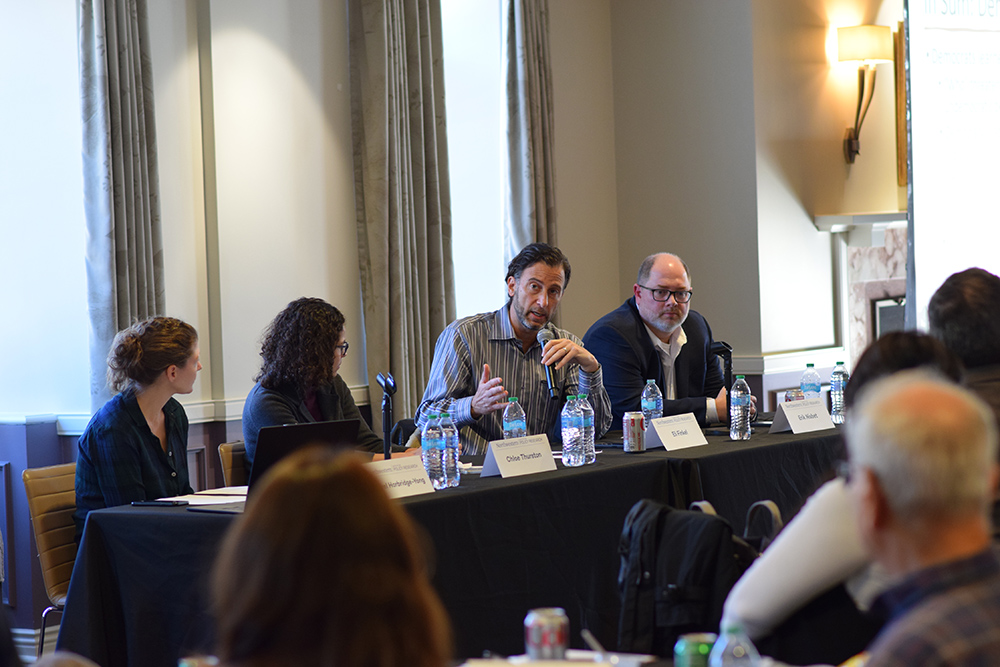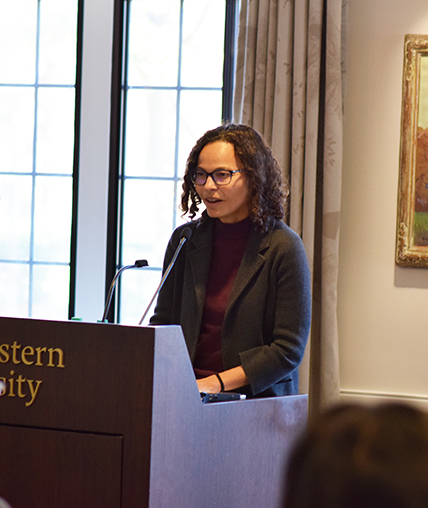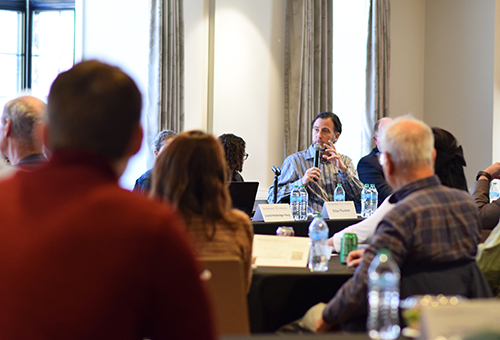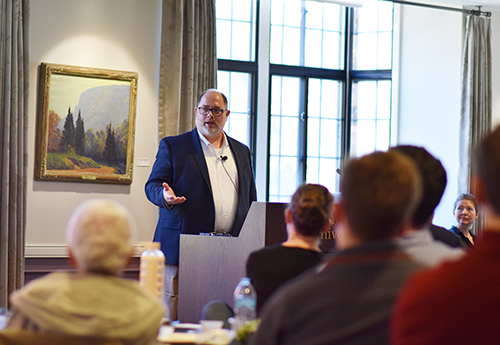What Happened in the 2024 Election?
IPR scholars discuss how the economy, policy, and the deep partisan divisions played into the election results
Get all our news
It's in moments like these that it's essential to come together in spaces like this and to work together to better understand these extremely complex issues.”
Andrew Papachristos
IPR Director

During IPR's post-election panel on Nov. 11, IPR fellow Eli Finkel discusses how moral outrage has contributed to polarization in the United States.
During a Nov. 11 post-election panel, four IPR experts unpacked the 2024 election results, putting polls, partisanship, and policy reactions into context for the more than 160 in attendance.
“The past few weeks and months have brought intense debate about the state and the direction of our country and our democracy,” IPR Director Andrew V. Papachristos said. “It's in moments like these that it's essential to come together in spaces like this and to work together to better understand these extremely complex issues.”
IPR political scientist Laurel Harbridge-Yong began by framing the election and the Republican sweep of Congress and the presidency, putting Donald Trump back in the White House for a second term.
“Coming into this election, it seemed like things might be close,” Harbridge-Yong explained, as polls showed a tight presidential race between former President Trump and Vice President Kamala Harris.
But the results didn’t end up being that close. All seven swing states went to Trump—who won 312 electoral votes to Harris’ 226—as well as the popular vote.
“In many respects, this was a normal, anti-incumbent election that just so happened to benefit an abnormal candidate,” she said, with poor perceptions of the economy and Biden’s low approval ratings helping the opposing party.
Harbridge-Yong then invited three IPR faculty panelists—political scientist Chloe Thurston, IPR social psychologist Eli Finkel, and communications and policy scholar Erik Nisbet—to reflect on what their research reveals about this political moment.
Policy Doesn’t Make Politics
How did the Biden administration’s policies influence the 2024 election’s outcome? Thurston argued the post-election narrative about whether the economy mattered more than concerns about democracy is incomplete.
“I think that there is a mistaken, in my opinion, view that robust economic policymaking that targeted specific areas and needs would restore faith in American democracy,” Thurston said.
During his time in office, President Joe Biden presented himself as occupying a role similar to President Franklin Roosevelt in a moment of economic and political crisis, she said. Biden’s administration had several successes with legislation like the Inflation Reduction Act and the CHIPS and Science Act, which led some, including Biden’s staff, to believe that voters would reward the administration for these policies at the ballot box.
“Policies can shift the political views of the mass public,” Thurston said. “They affect what people think the government can do, is capable of doing, but also what they value and what they don't necessarily want to lose.”

Chloe Thurston shares why policy didn't make politics in
the 2024 election.
But she sees a limit to how much policy can change voters’ attitudes toward politicians. Her research on policy feedback with IPR political scientist Daniel Galvin, shows that a person’s political identity is often what shapes their views about a given policy, not the other way around.
“This is one reason why Obamacare was not very popular among conservatives when it was first created, but many years later, people do appreciate some of the things that the Affordable Care Act provided them with,” she said.
And just because people benefit from policies passed by the opposing party, doesn’t mean that they will stop supporting their party. Ultimately, “Bidenomics” didn’t gain enough support to build a partisan majority and win Harris the presidency, Thurston explained.
“It's hard to design policy to produce its intended policy consequences,” she said. “It's harder still to design policy to produce our intended political consequences.”
Partisan Division Becomes a ‘Holy War’
To understand what happened in 2024, Finkel argued, you need to understand what’s been going on in presidential elections across the last decades. He explained that the margins in the popular vote in presidential elections have grown closer since the early 20th century, which means that immense power rests on a knife's edge every election.
As elections shift power in Congress and the presidency every few years “you see the parties really focus in on the differences,” he said.
To gain political power over their opponents, both parties use moral outrage to bring voters to the polls. While narrower election margins have made it more urgent to get votes, politics have calcified, or grown more rigid, meaning there’s less of a chance of big swings in either party’s favor. The narratives we share about elections also matter, Finkel says.

Eli Finkel responds to a question during the panel.
“The stories that we—when I say we, I mean active partisans—tell about what's happening in these elections gets more and more serious,” he said. He shared examples of both conservatives and liberals talking about their political opponents in existential terms, like a poll conducted in October 2020 where 70% of respondents agreed that “if the wrong candidate wins this election, America will not recover.”
As partisan division reaches new levels, Finkel argued that “our politics have become a holy war.” He cited research he co-led with former IPR political scientist James Druckman, now at the University of Rochester, showing that political sectarianism, or bitter partisanship where party members have more contempt for the other party than affection for their own, has increased.
“What I would like to propose to all of us, is to consider what the greater threat is to our society: Is it insufficient moral clarity, that is, we haven't really stood up with fervor for the things we believe in?” Finkel asked. “Or is it too much moral fervor—we are so sure of the rightness of what we're doing that we will absolutely do what is required to make sure that our side wins?”
Why ‘Democracy on the Ballot’ Lost
In the 2022 midterm elections, extreme candidates lost in heavily Republican areas in most cases, Nisbet said, which seemed to show the success of the Democrats’ message that democracy was at stake. Still, nearly 200 Republican candidates who denied the 2020 election results won their midterm races.
“What is undemocratic behavior by a candidate or party is easily rationalized based upon our polarized partisan views or sectarian views,” he explained.
But would a “democracy on the ballot” strategy or a strategy to unite against an illiberal candidate work in 2024? Nisbet asked. He cited a CNN poll showing that more voters in 2024 thought democracy was under threat than in 2022. So why did Trump win?

Erik Nisbet explains why "democracy on the ballot"
wasn't a winning strategy.
Nisbet argued that the way people define democracy matters. Through the Comparative National Elections Project, he conducted a survey on the issues Americans believe are important for democracy after the 2022 midterm election.
“What we see here is when we ask people how you define democracy, Trump did best or moved the needle among those voters who believe that democracy should be defined, at least to some degree, as ‘jobs for everyone,’” he said.
This broader, distributive understanding of democracy which includes economic wellbeing, benefited Trump who had a strong economy during his first term. In contrast, demographic groups that tended to understand democracy more in terms of free and fair elections or civil liberties like freedom of expression moved away from Trump in 2024 compared to 2020.
“My argument is that the Dems’ democracy strategy failed because they took the wrong lessons from the midterms,” Nisbet said. “Who threatens democracy and what is democratic is subjective and depends on very polarized views.”
Harris ultimately lost because she failed to communicate a vision of democracy that was “more inclusive for these other voters who were not very ideological, but look at democracy through a broader lens,” he said.
Eli Finkel is professor of psychology and management and organizations and a Morton O. Schapiro IPR Fellow. Laurel Harbridge-Yong is associate professor of political science and IPR associate director and fellow. Erik Nisbet is the Owen L. Coon Endowed Professor of Policy Analysis and Communication and an IPR associate. Chloe Thurston is associate professor of political science and an IPR fellow.
Photo credits: Lily Schaffer
Published: November 20, 2024.


